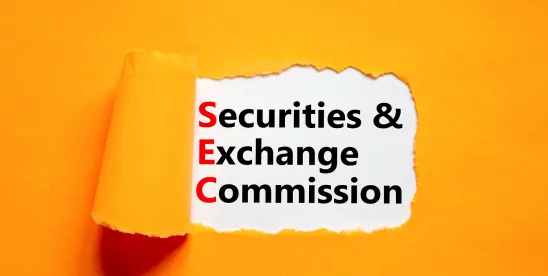The Securities and Exchange Commission’s (“SEC”) National Examination Program is designed to improve compliance, prevent fraud, monitor risk and inform policy. It is also a consistent source of referrals to the SEC’s Division of Enforcement. One of the best ways a fund manager can prepare for a possible exam and avoid enforcement risk is by developing a comprehensive understanding of the SEC’s exam and enforcement priorities. To help sort through key issues, takeaways and areas for fund managers to consider, we created a list of the top SEC exam and enforcement trends to watch.
Here are the top trends:
- Normalization of ESG Review: ESG‑related questions have become a normal part of an SEC exam. While there is less of a hyperfocus on ESG compared to previous years, ESG enforcement is still on the SEC’s radar, and fund managers should be prepared to address this topic. The SEC staff is actively confirming whether fund managers are acting consistently with the fund’s ESG disclosures and following through on ESG initiatives versus greenwashing. Fund managers should have ESG as part of their routine compliance program rather than waiting for a specialized ESG team to raise those issues. It will come up in most exams, so preparation and consistency is key.
- AI Washing as the New Greenwashing: As interest in AI usage has grown, so has the SEC’s interest in the technology. The agency has expressly stated that it is interested in “AI washing,” and views statements regarding use of AI as having a heightened level of materiality that will be closely scrutinized by the SEC. Managers need to be cautious with statements about how they use AI and carefully vet disclosures in this area to avoid garnering regulatory attention. As in the ESG context, the SEC will be assessing managers’ AI-related statements in marketing against their actual AI usage in practice.
- Off‑Channel Recordkeeping Still a Focus. As the SEC’s fiscal year ended in September, a number of off‑channel recordkeeping cases were announced. Their focus on this issue continues and is likely to come up in routine exams and future enforcement inquiries. Managers should therefore expect the SEC to remain interested in the details of their policies and procedures related to off‑channel recordkeeping, especially monitoring and managing employee text messages. As a result, we have seen managers move towards more advanced monitoring techniques and work-specific devices.
- The Marketing Rule Remains Relevant. Questions on the SEC’s Marketing Rule have become standard on exams. SEC examiners continue to scrutinize marketing materials, as well as a manager’s process for producing and reviewing marketing materials. Managers should therefore consider whether they will be able to demonstrate Compliance oversight during the review process and any related Compliance controls on marketing documents being sent to investors.
- Pay‑to‑Play in 2024 Election Season. Even after the close of this election season, the SEC will certainly be looking at pay‑to‑play matters to ensure investment managers are adequately monitoring political contributions by employees. Potential violations of the Political Contributions Rule are very easy for the SEC to identify from public campaign contribution records, and a manager may first learn of an employee contribution when it receives a letter from the SEC announcing its investigation. Managers, and their personnel, may wish to consider a contribution to a PAC rather than a specific candidate if the manager can receive a confirmation letter from the PAC that the contribution was not earmarked for a specific candidate or a limited number of candidates. Under the right circumstances, such letters can provide managers with comfort that the contribution is unlikely to trigger the Rule. Most PACs are very active in soliciting contributions from financial services firms, and, as a result, they tend to be familiar with the rules.
- Whistleblower Exception Language is a “Must‑Have”: The SEC has been bringing enforcement actions since 2015 involving confidentially agreements that could impede whistleblowing, including cases without evidence that whistleblowers were prevented from reporting. The SEC has also extended its focus beyond employment and severance agreements to fund documents and more. The message from the SEC is clear: any type of confidentiality agreement must be analyzed for compliance with the rule and whether the whistleblower carve‑out language is necessary.
- Indemnification/Exculpation Provisions in Agreements with Retail Investors: The Private Fund Adviser Rule release clarified the SEC’s position that overly broad indemnification and exculpation provisions that purport to waive the manager’s non-waivable duties under the Advisers Act may run afoul of federal fiduciary obligations under the Advisers Act, especially for retail investors. More recently, the SEC brought a case against a fund manager for doing just that in agreements with its retail clients. The takeaway for fund managers, particularly those that manage 3(c)(1) funds, is to review the language in their funds’ governing documents to ensure that it contains an appropriate “savings clause” clarifying that no Advisers Act duties are being waived.
- Don’t Get Caught with Late Filings: Filing late beneficial ownership and insider transaction reports is another easy way to garner unwanted SEC attention. In recent years, the SEC has conducted sweep investigations to identify late filers and bring a wave of enforcement actions. To avoid being part of this group, it is important to have a system in place to monitor transactions and promptly identify triggering events that require an SEC filing. This is especially important with the accelerated filing deadlines under new beneficial ownership rules.
- A Constant Focus on the Custody Rule. One area that remains constant for the SEC is the rules governing how investment advisers handle custody of client assets. The SEC has been lowering its threshold for enforcement on custody rule violations each year. Parallel fund vehicles or SPVs that are not receiving audits for various reasons are now drawing increased scrutiny. Even minor infractions that previously may not have warranted attention could draw a closer look, particularly if a manager is unlucky enough to be picked up in one of the SEC’s periodic sets of Custody Rule “sweep” exams.
- Written, Reasonably Designed MNPI Policies Required. Since 2020, the SEC has brought actions involving material nonpublic information (“MNPI”) policy violations, even when there were no trading violations alleged. Recent matters have focused on MNPI relating to privately traded securities and CLOs, with a particular focus on MNPI stemming from managers’ credit-related investment activities. As a result, managers should ensure that they have written, risk‑based policies that are reasonably designed to address all sources of MNPI and should ensure that they are documenting their compliance with those policies.








 />i
/>i

